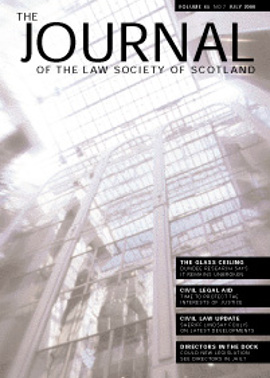The Scottish Parliament one year on
The Parliament has undertaken a great deal of work, especially in the legislative field. Six Acts have received the Royal Assent:
- The Adults with Incapacity (Sc) Act was welcomed by the Society after more than a decade of trying to have the existing, outdated law reformed. The tenacity and determination of Adrian Ward shows what solicitors can achieve.
- The Abolition of Feudal Tenure (Sc) Act. Every conveyancer will feel the effect of this legislation, although not perhaps immediately. The Act will not come into force until other aspects of the reform of title conditions are in place.
- The Mental Health Public Safety and Appeals (Sc) Act was the very first piece of legislation brought before the Parliament and the only one so far to be introduced under the emergency provisions. It was designed to fill a gap in Mental Health legislation which had been used to secure the release of a patient in the State Hospital.
- The Society had little involvement in the Public Finance and Accountability (Sc) Act ,the Budget Scotland Act 2000 or the Census Amendment (Scotland) Act.
- Seven Executive bills and five Members bills are currently being considered. The Society has been very active in commenting on many of these measures where necessary proposing amendments which have been advanced by Executive and opposition MSPs alike. In addition there have been one hundred and forty seven pieces of subordinate legislation, regulations and orders. The Society has been involved in responding to consultations, giving evidence to several of the Parliament’s committees and dealing with amendments as bills have progressed through the unique Scottish legislative system.
- The outcome of the consultation on the Millan Report on the review of the Mental Health (Scotland) Act 1984 is expected. The McLean report on the sentencing of serious, violent and sexual offenders has been published and the commitment of the Executive to consulting interested parties about the cross-examination of victims of sexual crime has been made clear. The Society will respond to any consultation undertaken and has already given evidence before the Justice and Home Affairs Committee on this issue and suggested areas for change and improvement of the law and practice.
The Committee structure has given the opportunity for Scottish people and organisations to have their say and state their views before legislation has been passed. Organisations ranging from trade unions, to employers organisations and the voluntary sector to professional bodies have used those opportunities well. MSPs and the parliament in plenary session have been open to the flow of comment and there seems a greater interest and awareness in our parliament and its work that was and, for reserved matters, still is, at Westminster.
Scottish politics has developed an identity of its own with the coalition setting a different tone to the politics the country has been used to. Systems have changed, traditions created, new procedures introduced and a more conciliatory approach adopted. This is both an advantage and a disadvantage for those who work in and with the Parliament. There has been a great deal of learning for all involved.
It will be interesting to watch the Parliament develop in the next session, particularly with a Westminster election looming. How will the politics of Westminster influence the activities of the Scottish Parliament and how will the activities of the Scottish Parliament affect the Westminster campaigns? One thing for certain is that the Scottish people will vote and will have their say and that the Society will be working with the Scottish and Westminster parliament to promote better law for solicitors and their clients.
Meantime at Westminster the Society is closely following the progress of the Regulation of Investigatory Powers Bill (unfortunately named the “RIP Bill”) a most important piece of legislation which has implications for the duty of confidentiality. The UK bill has four parts part I deals with interception of communications, part II with surveillance, part III with the investigation of electronic data protected by encryption and part IV which covers the scrutiny of the use of the powers under the bill. There is a Regulation of Investigatory Powers(Sc) bill currently in the Scottish Parliament which corresponds only to part II of the UK bill. Both measures could have considerable impact on the Solicitor’s profession and the Society is devoting considerable resources to ensuring that the views of the Society are heard both at Westminster and Holyrood. The Society has also been active in the Child Support Pensions and Social Security Bill and the Insolvency Bill.
This year’s Finance Bill has been something of a marathon and the tax law Committees have worked on key areas of the bill, for example on tax investigations.
All in all the recesses will be a period of relative calm for the Society’s Law Reform Department. With the election looming for the Westminster Parliament and the prospect of more than 15 bills at the Scottish Parliament the 2000/2001 sessions will be exceedingly busy.
Michael P. Clancy is Director of Law Reform at The Law Society of Scotland
In this issue
- President's report
- Still a glass ceiling for women solicitors?
- Resuscitating civil legal aid
- Companies and directors in the dock
- The Scottish Parliament one year on
- The law of design
- Discretion in granting decree by default
- Representing clients in mediation
- Risk assessments (health and safety regulations)
- The headache of domain names
- Reminder of routine risk issues






